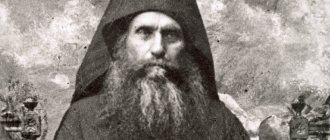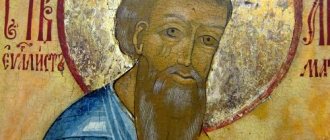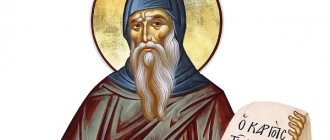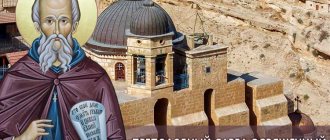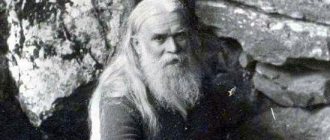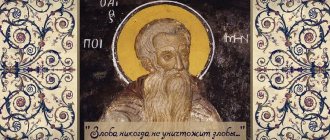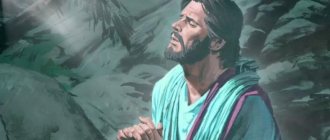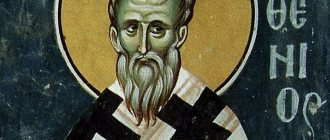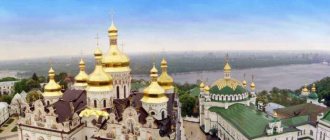"Save me, God!".
Thank you for visiting our website, before you start studying the information, please subscribe to our Orthodox community on Instagram, Lord, Save and Preserve † - https://www.instagram.com/spasi.gospodi/. The community has more than 60,000 subscribers. There are many of us like-minded people and we are growing quickly, we post prayers, sayings of saints, prayer requests, and timely post useful information about holidays and Orthodox events... Subscribe. Guardian Angel to you!
He was considered the leader of the monastic movement in the deserts of Palestine. He was a long-awaited child who at one time decided to repay the Lord for his appearance. He began to zealously serve him and preach Christianity. Euthymius the Great is highly revered in Christianity, and his memorial day falls on February 2.
Life of a Saint
As already said, his parents had been waiting for his appearance for quite a long time. After long prayers, which were heard, in 378 he was born in Lesser Armenia. Many believe that his appearance marked the beginning of a “quiet” time, which arose after 40 years of persecution.
At the age of three, his father died, and his mother took the boy to the priest. He immediately realized that God’s grace was on him. He was baptized and made a reader in this temple. Thus began the life of Euthymius the Great. In the priest's house, education took place in the spirit of reverence for the Holy Scriptures. He was taught to pray unceasingly and perform divine services. He left his home only for the purpose of visiting the ascetic monks.
Every year from Epiphany to Easter he spent alone in the desert. All this time he prayed to the Lord. Already at the age of 19 he was elevated to the rank of commander over all the monasteries in the area. He spent 10 years like this, but then left everything and went to Jerusalem. He had a desire to imitate the life of Christ. Living in a secluded cell, he met his brother in spirit Theoktist.
The best article for you, go to: John the Theologian icon, what it helps with, meaning, how to pray
Every year they spent Lent in the desert near the Dead Sea. The Lord pointed them to a cave where they next built the Church of God. After some time, shepherds found their shelter and began to take care of the people’s food. He devoted a long time to serving the Lord and was a true example of a God-fearing and meek attitude.
He knew about his death earlier and he clearly knew when it would happen. But no one knew about this.
Venerable Euthymius the Great, hieromonk
The Monk Euthymius the Great came from the city of Melitina in Armenia, near the Euphrates River. His parents, Paul and Dionysia, noble people, were pious Christians. For a long time they did not have children and, finally, through fervent prayers, they had a son, whose birth was preceded by a Divine vision that foreshadowed a great future for the baby.
The father of the Monk Euthymius soon died, and the mother, fulfilling her vow to dedicate her son to God, gave him to be raised by her brother, Presbyter Eudoxius. He introduced the boy to the Bishop of the Melitene Church, Otrius, who lovingly took upon himself the care of him. Seeing his good behavior, the bishop soon made him a reader. Then Saint Euthymius accepted monasticism and was ordained to the rank of presbyter. At the same time, he was entrusted with the management of all the city monasteries. The Monk Euthymius often visited the monastery of St. Polyeuctus, and during the days of Great Lent he retired into the desert. The position of manager of monasteries was burdensome for the ascetic who sought silence, and in the 30th year of his life he secretly left the city and headed to Jerusalem, where, having venerated the holy places, he retired to the Faran Lavra. There, having found a secluded empty hut outside the monastery, he settled in it, earning food by weaving baskets. Not far away, the Monk Theoktist asceticised. Both had one desire for God, one will, one goal. Usually, after the feast of the Epiphany, they retired to the Kutilian desert (not far from Jericho). One day they stayed there, choosing a difficult place in the mountains, and settled in a cave. Soon, however, the Lord opened their solitude for the benefit of many people: the shepherds, driving their flocks, found their cave and told them in the village. People seeking spiritual benefit began to flock to the hermits. Gradually a monastic community arose; several monks came from the Faran monastery, among them Marin and Luka. The Monk Euthymius entrusted his friend Theoktistus with managing the monastery that arose, and he himself became the confessor of the brethren. He instructed his brethren: “Know that those who wish to lead a monastic life should not have their own will, always be in obedience and humility, and have mortal memory in their minds, fear Judgment and eternal fire and desire the Kingdom of Heaven.”
The monk commanded young monks to combine physical labor with inner thought of God. “If the laity,” he said, “work a lot to feed themselves and their families and, in addition, give alms and make sacrifices to God, all the more should we, monks, work to avoid idleness and not feed on the labors of others.” Abba demanded that the monks remain silent in the church during services and at meals. He did not allow the young monks who wanted to fast more than other brethren to follow his will, but instructed them to eat the common food at the meal with abstinence, without becoming satiated.
In those years, the Monk Euthymios converted and baptized many Arabs, among whom was the military leader Aspevet with his son Terevon, whom the Monk Euthymios healed of his illness. Aspevet received the name Peter in Baptism and subsequently became a bishop among the Arabs.
The fame of the miracles performed by the Monk Euthymius quickly spread. People began to flock from everywhere, bringing with them the sick who received healing. Unable to bear human rumor and fame, the monk secretly left the monastery, taking with him only his closest disciple Dometian. He retired to the Ruva desert and settled on the high mountain of Marda, near the Dead Sea. In search of solitude, the monk went deep into the desert of Ziph and settled in a cave in which the holy King David once hid from the persecution of King Saul. There the Monk Euthymius founded a monastery, and in the cave of David itself he built a church. At that time, the Monk Euthymius turned many desert monks away from the Manichaean heresy, performed miracles, healed the sick and those possessed by demons.
Visitors who came to the saint disturbed the peace of the hermit, who loved silence, and he decided to return to the monastery of St. Theoktistus, which he had left behind. On the way, the monk took a fancy to a secluded place on the mountain and stopped there. His holy body was subsequently buried there.
Blessed Theoktist and his brethren went out to meet the Monk Euthymius and begged him to return to the monastery, but the monk did not agree. However, he promised to come to the monastery on Sundays for general worship.
The Monk Euthymius did not want to have anyone nearby, nor to organize a monastery or Lavra, but the Lord in a vision commanded him not to drive away those who came to him for the sake of saving his soul. After some time, the brethren gathered around him again, and he built a Lavra based on the model of the Faran Lavra. In 429, when the Monk Euthymius was 52 years old, Patriarch Juvenaly of Jerusalem consecrated the Lavra Church and established monasteries for presbyters and deacons.
Lavra was poor at first, but the monk firmly trusted in God, who could bestow upon people everything they needed. One day, about 400 travelers came to the Lavra - Armenians from Jerusalem, who were hungry. Seeing this, the Monk Euthymius called the steward and ordered him to feed the wanderers. The housekeeper replied that there was no such amount of food in the monastery. The monk, however, insisted. Arriving at the bread storage room, the housekeeper found a lot of bread in it. The same thing happened with wine and oil. The travelers ate to the glory of God, were satisfied, and after that there was still a three-month supply of food left for the brethren. So the Lord performed a miracle according to the faith of Saint Euthymius.
One day one of the monks refused to fulfill the obedience assigned to him. Despite the fact that the monk, having called him, urged him to obey, the monk persisted. Then the monk exclaimed loudly: “You will see what is the reward for disobedience!” The monk fell to the ground in a fit of madness. The brethren began to ask the Abba for him, and then the Monk Euthymius healed the rebellious man, who, having come to his senses, asked for forgiveness and promised to reform. “Obedience,” said Saint Euthymius, “is a great virtue. The Lord loves obedience more than sacrifice, and disobedience leads to death.”
Two brothers at the monastery of St. Euthymius were burdened by the harsh lifestyle and decided to escape. Foreseeing their intention in spirit, the monk called them and for a long time persuaded them to abandon their destructive intention. He said: “We should not listen to thoughts that instill sadness and hatred for the place in which we live, and instill a desire to move to another place. Let the monk not think that by moving to another place he will achieve anything good, since a good deed is achieved not by place, but by strong will and faith. And a tree that is often transplanted to another place does not bear fruit.”
In 431, the Third Ecumenical Council took place in Ephesus, directed against the heresy of Nestorius. The Monk Euthymius rejoiced at the establishment of Orthodoxy and grieved for Archbishop John of Antioch, who, being Orthodox, defended Nestorius.
In 451, the IV Ecumenical Council took place in Chalcedon against the heresy of Dioscorus, who, in contrast to Nestorius, argued that in the Lord Jesus Christ there is only one nature - Divine, which absorbed human nature in the incarnation (the so-called heresy of the Monophysites).
The Monk Euthymius accepted the confession of the Council of Chalcedon and recognized it as Orthodox. The news of this quickly spread among the monks and hermits, and many of them, who had previously believed incorrectly, following the example of Saint Euthymius, accepted the confession of the Council of Chalcedon.
For his ascetic life and firm confession of the Orthodox faith, Saint Euthymius received the title of the Great. Weary of communicating with the world, the holy Abba withdrew for a time into the inner desert. After his return to the Lavra, some of the brethren saw that when he performed the Divine Liturgy, fire descended from heaven and surrounded the saint. The monk himself revealed to several monks that he had often seen an Angel performing the holy liturgy with him. The monk had the gift of clairvoyance, saw the inner movements of the spirit and recognized human thoughts. When the monks partook of the Holy Mysteries, it was revealed to the monk who was approaching with dignity and who was to condemn himself.
When the Monk Euthymius was 82 years old, blessed Savva (the future Savva the Sanctified, commemorated December 5), then still a youth, came to him. The elder received him with love and sent him to the monastery to the Monk Theoktistus. He predicted that the monk Savva would shine in his monastic life.
When the saint turned 90 years old, his associate and friend, the Monk Theoktist, fell seriously ill. The Monk Euthymius went to visit a friend and remained in the monastery, said goodbye to him, and was present at his death. Having buried the body, he returned to the Lavra.
The time of repose was revealed to the Monk Euthymius by the special grace of God. On the day of remembrance of St. Anthony the Great, January 17, St. Euthymius gave his blessing to perform an all-night vigil and, calling the elders to the altar, told them that he would no longer hold a single vigil with them, because the Lord was calling him from his temporary life. Everyone was filled with great sadness, and the monk ordered the brethren to gather with him in the morning. He began to teach the brethren: “If you love me, keep my commandments, acquire love, which is the union of perfection. No virtue is possible without love and humility. The Lord himself, for the sake of love for us, humbled himself and became a man, just like us. We must therefore continually send praises to Him, especially we who have renounced the rebellious world. Never abandon church services; carefully preserve the traditions and regulations of the monastery. If any of the brethren struggles with unclean thoughts, constantly instruct and teach, so that the devil does not drag his brother into falling.
I also add another commandment: let the gates of the monastery never be locked for strangers and offer everything you have to those in need, and help those in need in adversity as best you can.” Then, having given instructions regarding the leadership of the brethren, the monk promised to remain in spirit with all who wish to carry out exploits in his monastery until the end of the century.
Having dismissed everyone, the Monk Euthymius left one disciple Dometian near him and, having stayed with him inside the altar for 3 days, died on January 20, 473 at the age of 97 years.
Numerous monks from monasteries and hermitages immediately flocked to the burial of the saint, among whom was Saint Gerasim. Patriarch Anastasius also arrived with the clergy, as well as the Nitrian monks Martyrius and Elijah, who later became the Patriarchs of Jerusalem, as the Monk Euthymius had predicted to them.
Blessed Dometian did not leave the teacher’s grave for 6 days. On the 7th day, he saw his Abba, joyfully announcing to his beloved disciple: “Come, child, to the rest prepared for you, for I begged the Lord Christ that you be with me.” Having told the brethren about the vision, Saint Dometian came to the church and in joy gave up his spirit to the Lord. He was buried next to Saint Euthymius. The relics of St. Euthymius the Great were in his monastery in Palestine; in the 12th century they were seen by the Russian pilgrim Abbot Daniel.
See also: “ The Life of our Venerable Father Euthymius the Great” as presented by St. Demetrius of Rostov.
Holy face
There are several options for depicting this saint. Which one to choose is an individual matter. It will not in any way affect the receipt of a response to your petitions. Often on the icon Euthymius the Great is depicted as an old man. In his facial features you can read wisdom and awareness of what he devoted most of his life to.
The best article for you, go to: Icon Recovering the Lost in what ways does it help?
There is an opinion that reading a prayer before it will definitely result in a positive result. It is important that the words come from a pure heart.
Holy monastery
Before his death, he gave orders to his followers about where to build a church and other buildings. He spent his last days in the original place of his prayer. For three days he prayed himself in the altar of the church. Various miracles occurred at his grave for a long time.
Afterwards, the temple of Euthymius the Great was built on this site. They immediately began to honor him and hold prayer services. Crowds flocked to this place. You can read the texts both at home and in church. The words can come from the heart or be read from a prayer book. Here is the most common troparion to St. Euthymius:
«Rejoice, non-creating desert, be complacent, non-painful, for your husband has multiplied your children’s spiritual desires, planting them with piety and cultivating perfection in virtues through abstinence. With his prayers, Christ God, calm our belly.”
God bless you!
Watch another video story about Saint Euthymius:
"Holy healer of souls and bodies." Venerable Euthymius the Great. Orthodox calendar for February 2
February 2 (January 20 according to the old style - church Julian calendar). Wednesday of the 33rd week of Pentecost (33rd week after the feast of the Holy Trinity, Pentecost). It is a fast day and fish is blessed at the meal. In the Russian Orthodox Church today the memory of 12 saints known by name is celebrated. Next we will briefly talk about them.
Venerable Euthymius the Great . Saint of the 5th century , one of the founders of Palestinian monasticism. The future elder was born in the Roman province of Armenia Minor around 377 AD . At the age of 28, the young Father Euthymius, by that time already ordained to the priesthood, went on a pilgrimage to Jerusalem and, after worshiping its shrines, took upon himself the feat of hermitage. A few years later, a monastic community was formed around Father Euthymius; the monk himself, although he became the confessor of the brethren, continued to live in seclusion, only occasionally leaving it.
Palestinian Elder: February 2 – Memory of St. Euthymius the Great
The image of Elder Euthymius, mentor of monks and interlocutor of angels, was loved throughout the Christian world. Russian monks also sought to imitate him, who founded a temple in honor of this great saint in one of the northernmost monasteries of Rus' - the ancient Kirillo-Belozersky Monastery. As the life of St. Euthymius narrates:
In the middle of the 5th century, when a significant part of Palestinian monasticism sided with the Monophysite heretics, the already middle-aged Father Euthymius began to consistently fight for the purity of Christian doctrine. Moreover, it was he who returned the Empress Eudokia, who lived in Jerusalem, to Orthodoxy...
The Monk Euthymius the Great died at a ripe old age in 473 from the Nativity of Christ. And today, one and a half millennia later, this saint still shows us an example of a strict and ascetic shepherd. And at the same time - a healer, miracle worker and wise mentor for all who have connected their lives with the Church of Christ.
* * *
Martyrs Inna, Pinna and Rimma . These holy sufferers for Christ and His Church (it is worth noting that the names belong to men) lived in the second half of the 1st - beginning of the 2nd century after the birth of Christ. They were originally from Northern Scythia, and therefore, according to legend, they were Slavs (or rather, their ancestors, in modern science called Proto-Slavs). Inna, Pinna and Rimma accepted Christianity during the years of preaching in the lands of future Russia by the Holy Apostle Andrew the First-Called , becoming his disciples. Subsequently, these saints enlightened many pagans with the Light of Christ's Truth, for which they were captured and executed by the local prince, who ordered the martyrs to be immersed in an ice hole.
Martyrs Inna, Pinna and Rimma. Photo: www.pravoslavie.ru
Martyrs Vassus, Eusebius, Eutyches and Basilides . Saints who accepted suffering and crowns of martyrdom at the turn of the 3rd-4th centuries , during the period of the most severe anti-Christian persecution of the pagan emperor Diocletian (Diocletian), who reigned in the Roman Empire in 284-305 A.D. The sufferers themselves were courtiers of the wicked emperor. Having witnessed the martyrdom of the Hieromartyr Theopemtus, Bishop of Nicomedia (whose memory is celebrated on January 18 in the new style), Saints Vassus, Eusebius, Eutyches and Basilides believed in Christ and accepted Holy Baptism. For this, the sufferers were subjected to the most severe torture, after which they were brutally killed in 303 AD.
Martyrs Vassus, Eusebius, Eutyches and Basilides. Photo: www.pravoslavie.ru
Reverends Lavrenty, the recluse of Pechersk, and Euthymius, the schema-monk of Pechersk . Russian saints who performed spiritual deeds in the famous Holy Dormition Kiev-Pechersk Lavra in the XIII-XIV centuries after the Nativity of Christ.
Venerable Euthymius of Syangzhemsky, Vologda . The saint of the Russian North, who labored in the 15th century , first in the Spaso-Kamenny Monastery on Lake Kubenskoye, and then moved for the purpose of monastic solitude to the bank of the Syangma River, which is 20 versts from the city of Vologda. Subsequently, Elder Euthymius founded a new monastic monastery in these places. The saint died around 1470 from the Nativity of Christ.
Hieromartyr Pavel Dobromyslov, presbyter . An Orthodox priest who suffered for his faith during the period of Soviet atheistic persecution and accepted the crown of martyrdom on this day in 1940 . Glorified among the many thousands of new martyrs and confessors of the Russian Church.
* * *
Congratulations to Orthodox Christians on the memory of today's saints! Through their prayers, Lord, save and have mercy on us all! We are happy to congratulate those who received names in their honor through the Sacrament of Holy Baptism or monastic tonsure! As they used to say in Rus' in the old days: “To the Guardian Angels - a golden crown, and to you - good health!”
To our departed relatives and friends - eternal memory!
